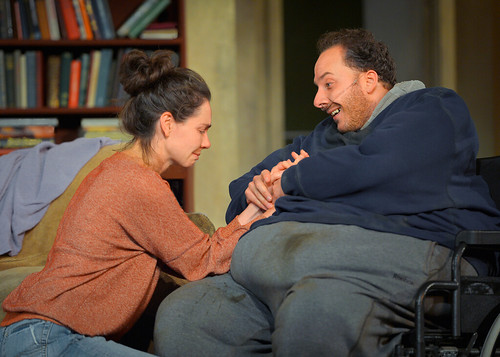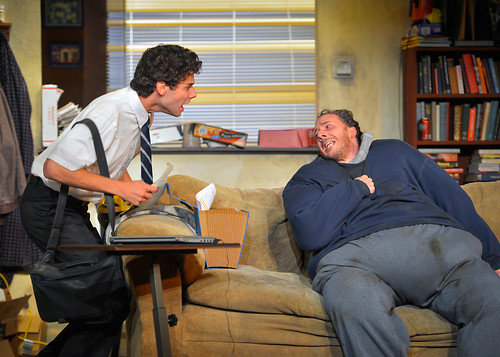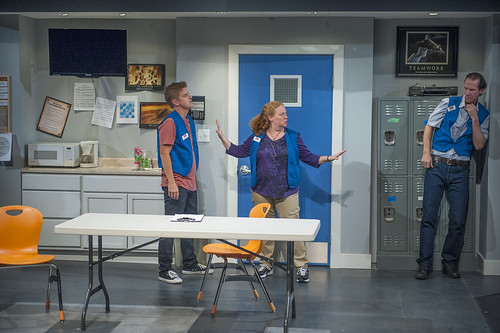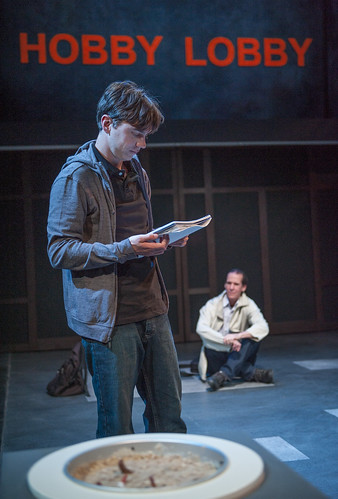
Liz Sklar is Liz, a nurse and a friend, and Nicholas Pelczar is Charlie, a man who needs friends and nurses in Samuel D. Hunter’s The Whale at Marin Theatre Company. Below: Charlie receives some help from a passing Mormon missionary (Adam Magill). Photos by Kevin Berne
Samuel D. Hunter’s The Whale, now at Marin Theatre Company is a difficult play to watch. That description might not make you want to run out and buy a ticket, but hold on. Difficult doesn’t preclude greatness.
At first glance, the play, winner of MTC’s 2011 Sky Cooper New American Play Prize, involves a guy in a fat suit. Granted, it’s a really good fat suit (Christine Crook is the costume designer), but faking a 600-pound guy and watching an actual 600-pound guy are very different experiences. But here’s the thing: what actor Nicholas Pelczar brings to that suit is extraordinary.
He plays Charlie, a sweet-natured man stuck on his couch (which is raised and supported by cinder blocks) in a Northern Idaho town (the cramped, dingy set is by Michael Locher). He makes a living doing online tutorials, and his friend Liz (Liz Sklar), who happens to be a nurse, brings him junk food, makes cursory efforts to clean his outrageously filthy apartment and cares for his well being as best she can. It’s a losing battle, what with Charlie’s congestive heart failure and his utter unwillingness (not to mention lack of medical insurance) to consider a visit to the hospital.
Hunter, a savvy playwright whose A Bright New Boise was a wow at Aurora Theatre Company last fall (read that review here), focuses a lot of attention on Charlie’s heart. It’s a broken heart to be sure – the loss of his boyfriend years before precipitated his long, slow suicide by morbid obesity – but it’s a heart capable of tremendous compassion, for his faceless online students, for great writing, for the young daughter he essentially abandoned 15 years before. Physically, it’s no wonder that Charlie’s heart is giving out (we’re told at the top of the play that he’ll be dead by the weekend), but emotionally, it seems a man this lonely and this full of empathy would tax his heart in any condition.
There are many intriguing layers to this tale, directed with a sure hand by Jasson Minadakis, and though it’s a sad, sad tale, there is also a fair amount of humor, much of it provided by the acidic teenage daughter, played by Cristina Oeschger, who reunites with her father only because she thinks there might be money in it for her.
Pelczar imbues Charlie’s gargantuan body (outfitted in sweatshirt and sweatpants so grimy they rival his sofa for the things you would most want to avoid contact with) with such feeling, that you immediately root for him, even though the odds are decidedly not in his favor. The wheezing, the strenuous effort to journey from the couch to the walker to the bathroom is arduous and hard to watch, but then there’s Pelczar’s sweet face or Charlie’s even sweeter nature there to remind you of the person underneath all that person. Charlie is not just sweet, either. He’s complicated. He’s a gay man who left his wife and child for a man and has sort of paid the price ever since. He had a great love, but that love broke him, and he’s constantly apologizing. He’s on a rough road, and the compassion and empathy he feels for the world rarely comes back to him.
There’s a flash of kindness from an unlikely friend when a Mormon missionary happens by Charlie’s apartment just as Charlie is in the grip of a scary heart incident. Elder Thomas (Adam Magill) wants desperately to believe his faith can actually help someone and he sees Charlie as perhaps his last chance. But Charlie has a tricky relationship with the Mormon Church, and the nature of that relationship is used as a sort of plot-propelling mystery.
The supporting cast, which also includes Michelle Maxson as Ellie’s at-the-end-of-her-rope mom, is fantastic and fits into the docu-drama world of Hunter’s play with ease. There are moments, especially when the playwright bangs the Moby Dick drum a little hard, when the stark realism veers dangerously close to melodrama, but pitfalls are avoided.
The Whale is a tragedy that ennobles a good man. It’s difficult and challenging but also uniquely beautiful.
FOR MORE INFORMATION
Samuel D. Hunter’s The Whale continues through Oct. 26 at Marin Theatre Company, 397 Miller Ave., Mill Valley. Tickets are $35-$53. Call 415-388-5208 or visit www.marintheatre.org.



